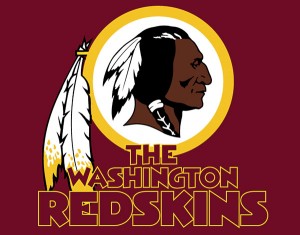
WASHINGTON, D.C. – The Washington Redskins were earlier denied a trademark for their name and logo by the U.S. Patent Office and are now pulling out all the stops in an appeal to preserve the patents, even dredging up disgusting examples of other businesses and websites which were allowed a patent.
Last June, by a preponderance of the evidence, the petitioners (a group representing Native Americans) established that the term “Redskins” was disparaging of Native Americans. Thus, in accordance with applicable law, the federal registrations for the “Redskins” trademarks were cancelled.
The Redskins have filed an appeal on October 30, 2015. Read below some of their reasoning in their appeal for keeping the patent:
This case involves the cancellation of six trademark registrations of the NFL’s Washington Redskins, one of the most storied franchises in sports, on the ground that the Team’s name supposedly “disparaged” Native Americans under the Lanham Act. To our knowledge, of the over three million trademarks registered since 1870, no registration has ever been retroactively cancelled for being disparaging. The Redskins are the first and only. The name is over 80 years old, and the registrations nearly 50. The PTO (Patent Trademark Office) initially registered the Redskins marks in 1967, and again in 1974, 1978, and 1990. Each time, no one objected. Each time, the PTO did not suggest that the marks disparaged anyone.
This was no oversight. By 1967, the Redskins had won two NFL championships. Native Americans, like all Americans, presumably knew of the Team, as did the PTO examiners who registered the Redskins marks. Yet in an extraordinary about-face, the PTO in 2014 scheduled the cancellation of the registrations—not because the Redskins marks are disparaging today, but because the PTO thought they disparaged a “substantial composite” of Native Americans in 1967 and thus should never have been registered in the first place.
The District Court erred in granting summary judgment against the Team. The five Native Americans who sought cancellation did not show any consensus by a “substantial composite” of Native Americans. By contrast, the Team presented extensive evidence of widespread Native American support for the Redskins name in 1967 and thereafter. Many Native Americans named their own sports teams the “Redskins,” and no Native American opposed registration in 1967 or sought cancellation for another 25 years. On a virtually identical record, the D.C. district court in 2003 held that the Team was entitled to summary judgment.
The PTO’s unprecedented cancellation also violated the First and Fifth Amendments to the Constitution. Section 2(a)’s disparagement clause is hopelessly vague. The PTO endeavored in 2014 retrospectively to discern whether an undefined, unquantifiable “substantial composite” of Native Americans in 1967 was insulted by the term “redskins.” And the PTO forced the Team to defend its marks in 2014 even though the passage of time was highly prejudicial, including because key witnesses were long deceased.
There are extraordinary free speech principles at issue far beyond the Redskins trademarks. Cancelling a registration based on the government’s disapproval of a trademark discriminates against speech based on content and viewpoint. The District Court nonetheless declared the PTO’s action exempt from any First Amendment scrutiny because registered trademarks are all “government speech” and registration is a government subsidy “program.”
The notion that all two million currently-registered marks are government speech is astounding. It is equally disturbing. The PTO has registered hundreds if not thousands of marks that the Team believes are racist, or misogynistic, vulgar, or otherwise offensive. By way of example only, the following marks are registered today: TAKE YO PANTIES OFF clothing; DANGEROUS NEGRO shirts; SLUTSSEEKER dating services; DAGO SWAGG clothing; DUMB BLONDE beer; TWATTY GIRL cartoons; BAKED BY A NEGRO bakery goods; BIG TITTY BLEND coffee; RETARDIPEDIA website; MIDGET-MAN condoms and inflatable sex dolls; and JIZZ underwear. These are not isolated instances. The government routinely registerspornographers’marks: TEENSDOPORN.COM,MILFSDOPORN.COM,THUG PORN, GHETTO BOOTY, and BOUND GANGBANGS are but a few.1
None of this is government speech. Nor is the government subsidizing these marks. Registration of trademarks, like copyrights and patents, is not akin to a government loan, grant, or other type of gift. Rather, the government, acting as a regulator, finds that because trademarks meet statutory criteria (namely, being distinctive), they are entitled to legal protection against interference from other private parties. And because trademark registration constitutes government regulation, this case is easy. A ban on registering “disparaging” trademarks unconstitutionally burdens speech based on content and viewpoint, just as would a ban on registering copyrights for “disparaging” books.
It does not matter, as the District Court concluded, that cancellation leaves mark-owners like the Redskins free to use their names, hoping other laws might protect against infringement, counterfeiting, and illegal imports. Whether cancellation deprives a mark of every last cent of its value is not the First Amendment test. The government cannot turn the lights off at a Redskins night game because the government disfavors the name, and defend the action because the Redskins can still play in the dark.
Registration confers indispensable legal protections, and the government cannot condition those protections on a trademark-owner’s agreement to forgo disfavored speech.
A professional football team’s name, like all sports-team names, is a subject of popular discourse and, sometimes, strong feelings and opinions. But withdrawing trademark protection is not a legitimate means for the government to weigh in on the matter. This Court should reverse the decision.








